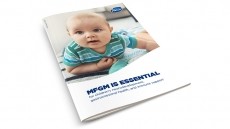Infant formula with leptin may cut obesity
against obesity later in life, if results from a rat study can be
translated to humans.
The research, from the University of Buckingham, reports that supplementing infant rats' diets with leptin resulted in adult animals that did not fat or develop diabetes, even when fed a high-fat diet. However, whether such a product would become available commercially remains highly debatable. Infant formula is a highly emotive area, with watchdogs keeping a close eye on companies' marketing tactics lest they drift towards promoting their products as preferable to breast-feeding. While it is agreed that breastfeeding is the best way to ensure an infant receives the nutrients it needs in its first months, formulas are indispensable in cases where mothers are unable to feed their children - be it for health or logistical reasons. Mothers' desire to give their children the best possible start in life means that there is scope for fortification. The latest market research on the overall baby food market, including milks and formulas, comes from Mintel, which estimates that the UK market was worth £329 million at retail in 2005. Research and product development on the ingredient side has centred on replicating the healthy profile of breast milk as far as possible. "The supplemented milks are simply adding back something that was originally present: breast milk contains leptin and formula feeds don't," lead researcher Mike Cawthorne told Chemistry & Industry Magazine. Leptin, the fat hormone that turns off hunger in the brain, is produced in the body throughout life. Its discovery was heralded as a major breakthrough, but research in adults proved disappointing because individuals soon seemed to resist its hunger-quenching effect. The new research, published in the American Journal of Physiology - Regulatory, Integrative and Comparative Physiology, investigated the effect of supplementing the diet of rats from day 14 of pregnancy and during lactation with leptin (2 mg/kg/d) on the energy balance in offspring. Cawthorne and co-workers reported that both male and female offspring that diet-induced weight gain was prevented and the weight of the animals fat pad was reduced. "Thus leptin levels during pregnancy and lactation can affect the development of energy balance regulatory systems in their offspring," concluded the researchers. Commenting independently on the research, Jonathan Seckl from the University of Edinburgh told Chemistry & Industry Magazine: "We need to know whether leptin is acting pre- and post-natally, figure out how it works, and dissect the possible side-effects before this becomes a potential approach for humans. Nonetheless, this is good science." Dr Ian Campbell, medical director of the charity Weight Concern, is quoted by the Independent: "Without evidence that this works in humans, it is pure flight of fancy that those consuming leptin from infancy will never get fat. I'd be surprised if this product could be advertised or marketed with these extraordinary claims. "To date, leptin has proved to be a great disappointment. Most of us have plenty and true deficiencies are rare. In fact, obese people tend to have higher than normal levels." Source: American Journal of Physiology - Regulatory, Integrative and Comparative Physiology Published on-line ahead of print, doi: 10.1152/ajpregu.00676.2006 "Prevention of diet-induced obesity and impaired glucose tolerance in rats following administration of leptin to their mothers" Authors: C.J. Stocker, E. Wargent, J. O'Dowd, C. Cornick, J.R. Speakman, J.R.S. Arch, M. A. Cawthorne Chemistry & Industry 23 April 2007, Page 6 "New Formula for fit future" Author: Lisa Melton










